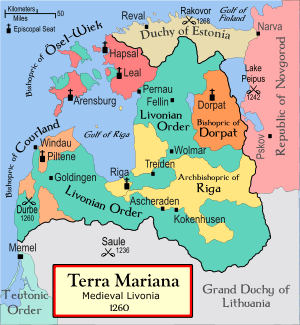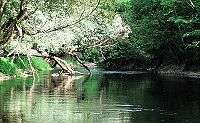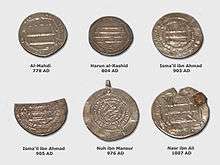Nurmekund
| Nurmekund | ||||||||
| Nurmekund | ||||||||
| ||||||||
 Ancient Estonia, Nurmekund is dark green. | ||||||||
| Capital | Pilistvere | |||||||
| Languages | Old Estonian | |||||||
| Religion | Estonian paganism, Thor cult | |||||||
| Government | Not specified | |||||||
| History | ||||||||
| • | Established | Migration period | ||||||
| • | Disestablished | 1224 | ||||||
| ||||||||
Nurmekund (Low German: Nurmegunde) was a small independent country (ancient Estonian county) on the north coast of Lake Võrtsjärv in Central Estonia, bordered by Sakala, Alempois, Järvamaa, Mõhu, and Ugandi. Nurmekund had an area of approximately 600 hides.

Monastic state of the Teutonic Knights, 1225 - 1250.

Livonia in 1260.

Põltsamaa river, the border river of Nurmekund, in 2005.
See also
- History of Estonia
- Imavere
- Kabala
- Kolga-Jaani
- Kõo
- Livonian Crusade
- Monastic state of the Teutonic Knights
- Pilistvere
- Põltsamaa
- Rulers of Estonia
- Võhma
External links
- Kuidas elasid inimesed vanasti, möödunud sajandil ja praegu (Estonian)
- 9. - 13. saj.pärinevad Eesti aardeleiud (Estonian)
- Eesti haldusjaotus ja võõrvõimude vaheldumine läbi aegade (Estonian)
- Põltsamaa linnus (Estonian)
This article is issued from Wikipedia - version of the 12/12/2015. The text is available under the Creative Commons Attribution/Share Alike but additional terms may apply for the media files.

